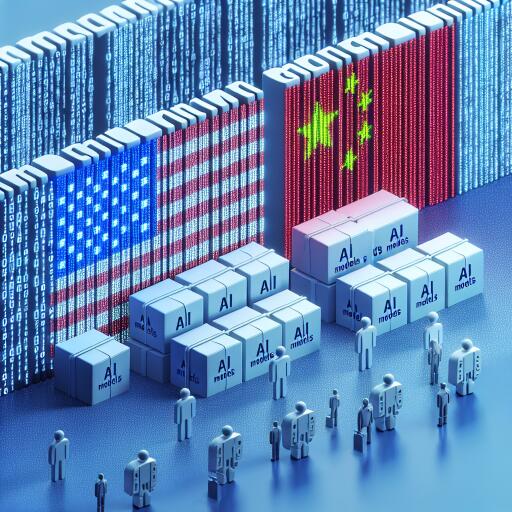US Aims to Restrict Exports of AI Technologies to China
The US administration is setting its sights on regulating the export of advanced American-developed artificial intelligence (AI) technologies. This move targets the curtailing of AI-driven technologies, especially those underpinning popular chatbot services, from reaching nations such as China and Russia.
China, over the past year, has aggressively pursued the development of its own generative AI sector, pushing local enterprises towards the adoption of domestically created technologies over foreign ones. This drive raises questions about the current level of China’s reliance on American AI innovations and the potential impact US policy changes could have on its burgeoning AI ambitions.
China’s AI Landscape and OpenAI
Despite the global buzz surrounding OpenAI’s sophisticated services like ChatGPT and the image-creating DALL-E, these have not seen an official release within mainland China. Challenges pertaining to local regulatory conditions have been cited as the primary barrier. Nevertheless, a workaround through the use of virtual private networks (VPNs) has seen Chinese firms and engineers leverage OpenAI’s offerings to develop their own software applications, often benchmarking their AI models against OpenAI’s.
However, access to OpenAI’s technology within China has faced hurdles. Notably, OpenAI discontinued services for ByteDance, the parent company of TikTok, subsequent to revelations of ByteDance utilizing OpenAI’s tech for AI developments. Additionally, while OpenAI’s suite of services remains inaccessible in Hong Kong, Microsoft has facilitated access to generative AI tools like Copilot, reinforcing how partnerships can extend OpenAI’s technology into restricted markets.
Open Source AI and China’s Position
The forthcoming US regulations primarily target the export of proprietary or closed source AI technologies, namely those not open to public access or scrutiny. Contrastingly, open source AI models, which are freely available and modifiable, would not fall under these new export controls.
China’s utilization of open source AI, including projects like Meta Platforms’ “Llama” series, signifies the country’s engagement with Western-developed AI technologies. Reports from high-profile Chinese research establishments have highlighted a significant reliance on such open source models for domestic AI development, alongside an acknowledgment of China’s urgent need for technological independence in AI.
Despite criticism surrounding the use of foreign AI systems, Chinese tech giants including Baidu, Huawei, and iFlytek are making strides towards self-sufficiency, claiming advancements in AI that parallel or exceed those of leading models like OpenAI’s GPT4 in various applications.
China’s Path to AI Self-Sufficiency
In response to the growing emphasis on foreign AI technologies, Chinese officials have underscored the importance of developing indigenous, “controllable” AI technologies. This sentiment is part of a broader narrative that views foreign AI tools, particularly those like ChatGPT, with suspicion regarding potential misuse for spreading disinformation.
Concurrently, China has been proactive in establishing regulatory frameworks for generative AI, mandating governmental approval for AI services prior to public release. To date, China has greenlit over 40 domestic AI models for public use, conspicuously excluding foreign AI applications from this approval list.
As the global AI race accelerates, the interplay between US policy shifts and China’s ambition for AI self-reliance will undoubtedly shape the future landscape of international AI development and deployment.









